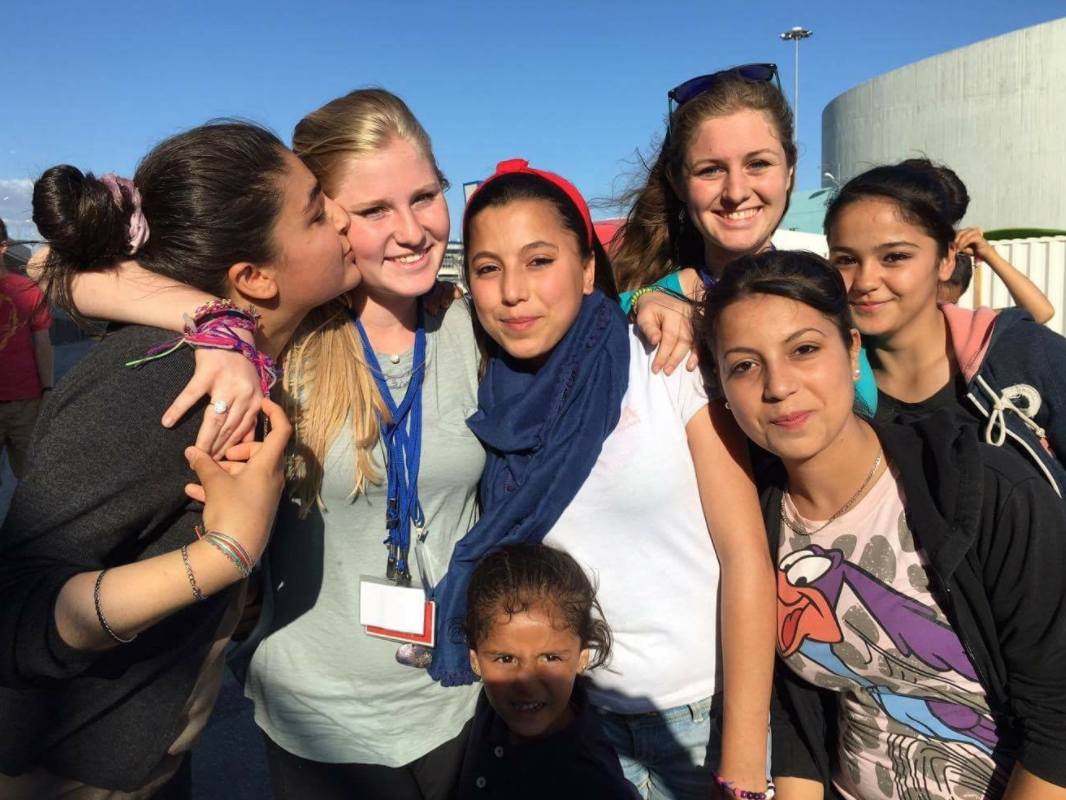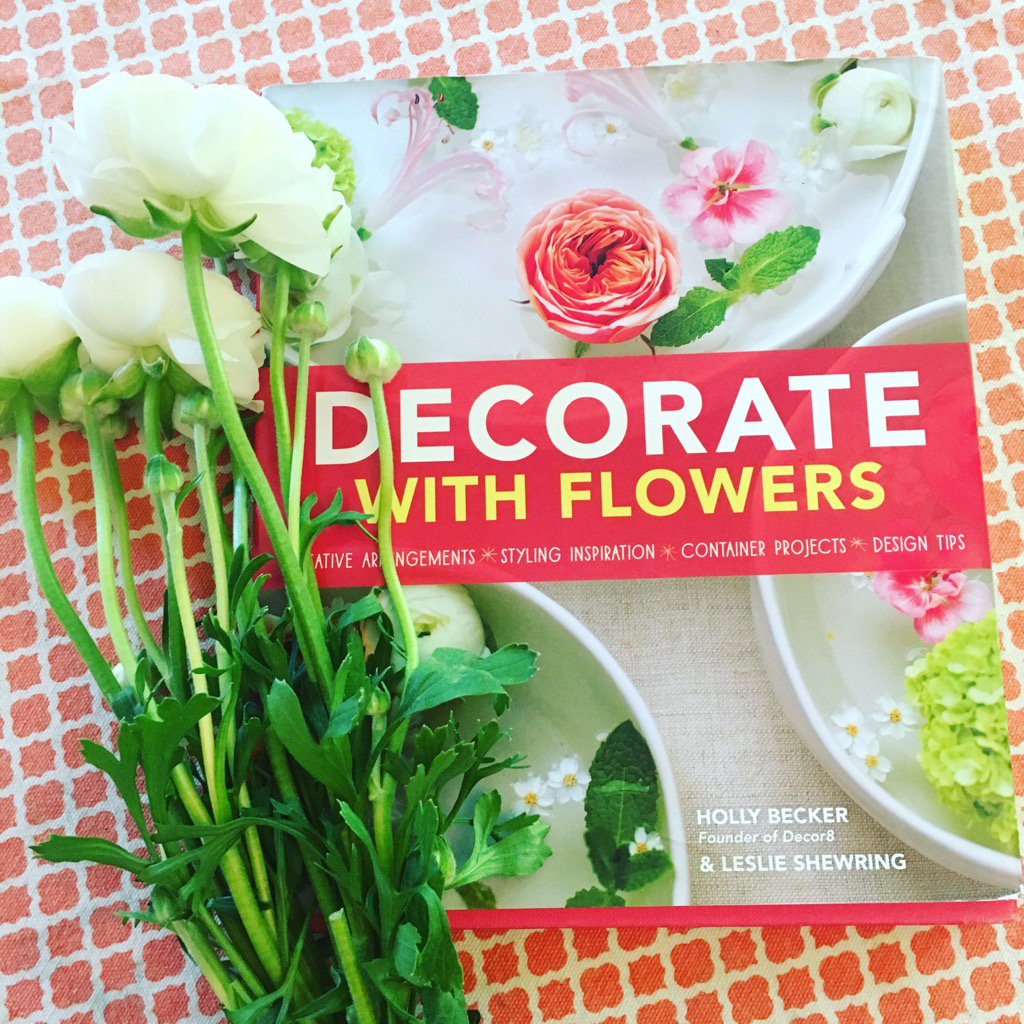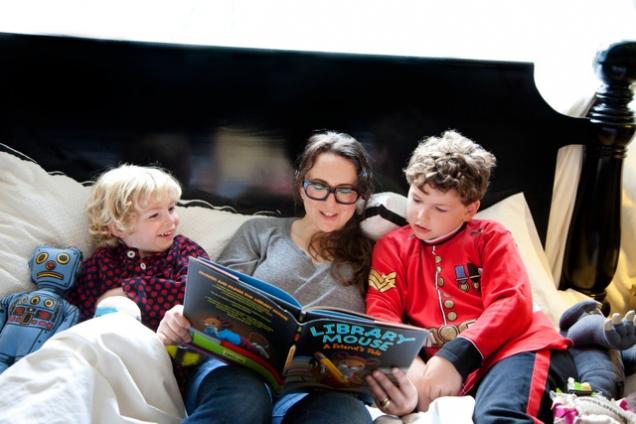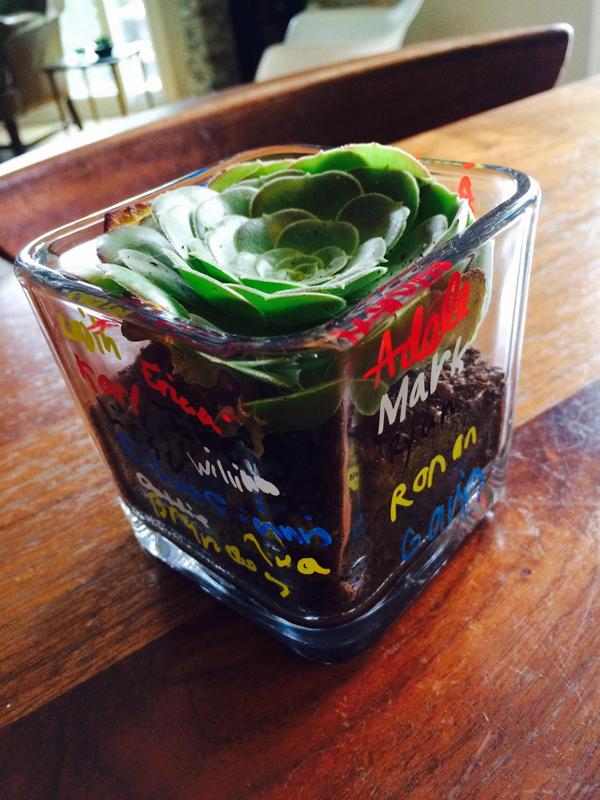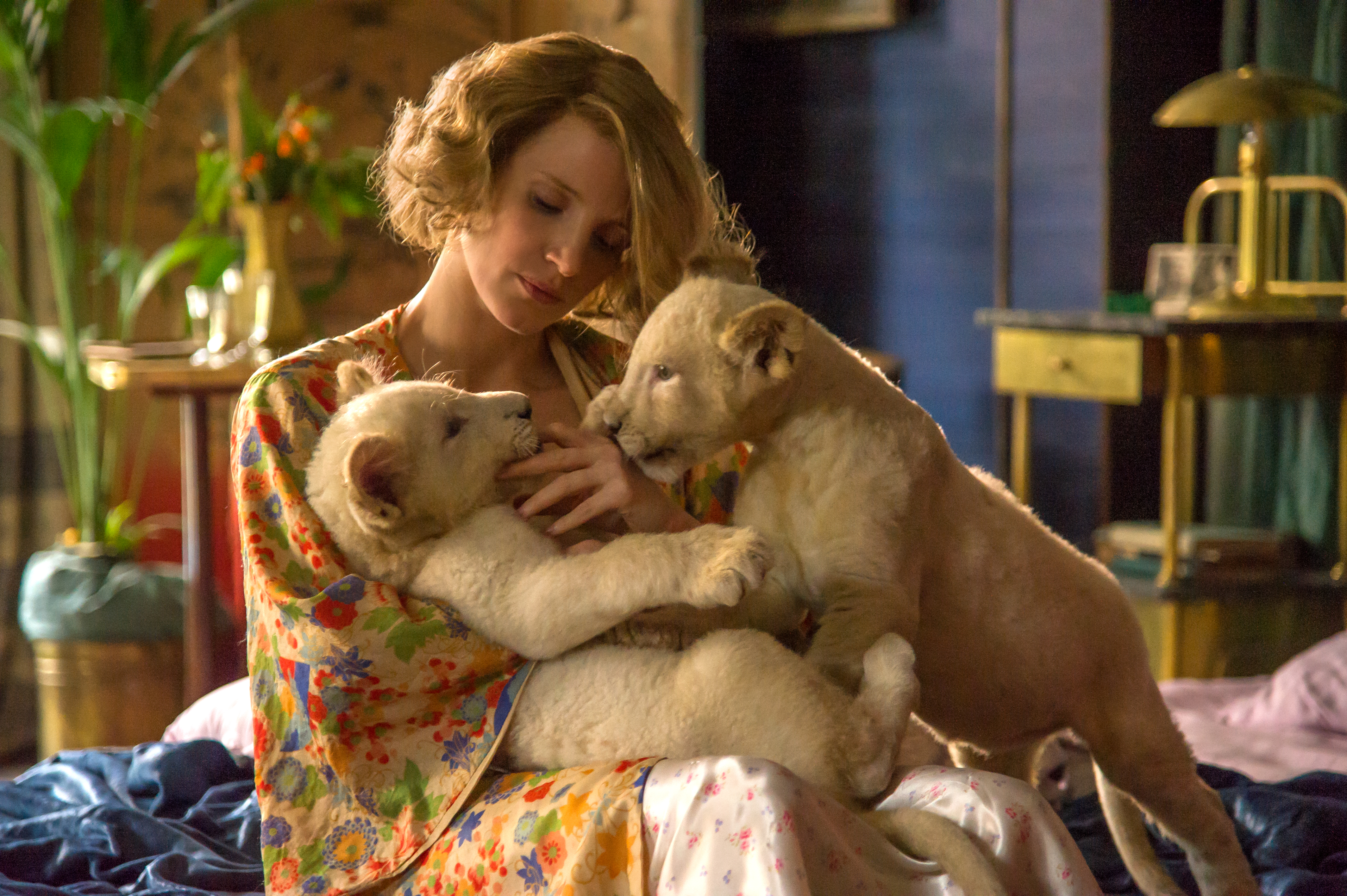
Exclusive Interview with Jessica Chastain of The Zookeepers Wife – Out in Theaters March 31st
The real-life story of one working wife and mother who became a hero to hundreds during World War II. In 1939 Poland, Antonina Żabińska (portrayed by two-time Academy Award nominee Jessica Chastain) and her husband, Dr. Jan Żabiński (Johan Heldenbergh of “The Broken Circle Breakdown”), have the Warsaw Zoo flourishing under his stewardship and her care. When their country is invaded by the Nazis, Jan and Antonina are stunned – and forced to report to the Reich’s newly appointed chief zoologist, Lutz Heck (Daniel Brühl of “Captain America: Civil War”). To fight back on their own terms, Antonina and Jan covertly begin working with the Resistance – and put into action plans to save lives out of what has become the Warsaw Ghetto, with Antonina putting herself and even her children at great risk.

Jessica Chastain stars as Antonina Zabinski in director Niki Caro’s THE ZOOKEEPER’S WIFE, a Focus Features release.
Credit: Anne Marie Fox / Focus Features
I had a chance to see an early screening of The Zookeeper’s Wife a few weeks back and I have to say this is one of my favorite movies this year. It is heartbreaking to see what happened to these innocent people who were treated so horribly because of their religion but this story needed to be told. About a woman and her family who risked everything to do the right thing. I’ve often wondered about what separates those who walk away from helping others and those who choose to risk their own lives to help others in need. It was a tremendous risk that Antonina took but one that literally saved hundreds of lives. I am so glad that this story was brought onto the large screen for others to learn about this courageous woman and her family. Even Jessica Chastain put it in perspective when one of the bloggers thanked her for taking on this strong female role and she redirected this appreciation back onto Antonina who is a real hero. This is a pretty powerful story and one I was really glad to see and learn about.

(ctr) Jessica Chastain stars as Antonina Zabinski in director Niki Caro’s THE ZOOKEEPER’S WIFE, a Focus Features release.
Credit: Anne Marie Fox / Focus Features
Director: Niki Caro (“North Country,” “Whale Rider,” “McFarland, USA”)
Writer: Angela Workman (“War Bride”), based on the nonfiction book by Diane Ackerman
Cast: Jessica Chastain, Johan Heldenbergh, Michael McElhatton, and Daniel Brühl

Jessica Chastain stars as Antonina Zabinski in director Niki Caro’s THE ZOOKEEPER’S WIFE, a Focus Features release.
Credit: Anne Marie Fox / Focus Features
For more info, please follow the film on social:
Official Site I Facebook I Twitter I Instagram

(l-r) Johan Heldenbergh and Jessica Chastain star as Jan and Antonina Zabinski in director Niki Caro’s THE ZOOKEEPER’S WIFE, a Focus Features release.
Credit: Anne Marie Fox / Focus Features
A group of mom bloggers had a chance to interview Ms. Chastain via conference call. She was very sweet and you got the impression she felt strongly about telling this story as authentically as she could – from Antonina’s mannerisms to how she dressed. Apparently, when Jessica spoke to her children they told her that their mother never wore anything but dresses. She was very ladylike but had this strong determination about her. Jessica plays this character beautifully!
Q : Thank you so much for representing such a strong and resilient woman on the big screen, with everything that’s going on in the world, we really need that. So, I want to say thank you for doing such a superb job, you were absolutely outstanding.
Jessica : Thank you so much, well if there wasn’t women like Antonia there would be nothing to represent so I, I have so much admiration for her.
Q : Regarding the animal, was there one that you were kind of a little shy of?
Jessica : No [LAUGHS] um, I, I, I loved every animal. Like, even the skunk, I and some people like the little boy who was nervous about the skunk because, yeah um, a very pungent smell. But, I swear I was kissing all over that skunk and cuddling you know, in the scene. And, um, there was not one animal that I felt afraid, you know that I felt it, it wasn’t a good situation.
Q : You looked super comfortable holding all of them.
Jessica : Thank you.
Q : Hi, Jessica.
Jessica : Hi.
Q : All the ladies, we were all crying throughout the movie, it was very heartbreaking. What kind of moved you to want to be part of this film?
Jessica : I was really inspired by the idea, ‘what does it mean to be in a cage?’ Uh, and I think that was a unique take that Nikki had on the project. You know, the people in Warsaw was in a way a cage, because she even has a shot of a couple on a date outside the ghetto and they stand in front of the bars and they take a picture, almost like they’re at a zoo.
Q : Yeah.
Jessica : And so there’s this like idea of you know, I don’t think animals and people are that different. Uh, and I think sometimes uh, in mankind we, we try to separate ourselves. You know, different religions and countries and ethnicities and, and try to point to the other. And instead, for me I love this idea of every living being, being protected and being free and being honored uh, to live their lives in the most healthy um, compassionate way possible. And I, I felt that the zookeepers wife really um, explored that message.
Q : Thank you so much.
Jessica : Thank you.
Q : Hi Jessica, this is Courtney, how are you?
Jessica : Hi Courtney, good, thank you.
Q : I have a question about the wealth of resources to go to researching your role, where did you begin? Did you just read the script as your guide or did you also read the book and dip into real life archives? Where did your character start for you?
Jessica : Yeah, well, I first started, of course with the script because that was my um, introduction to the world. Then I read the book, which was amazing because it basically is in Antonia’s um, own words uh, you know, it’s, it’s from her journal that was discovered. Uh, and I found a lot from there, I went to the Warsaw Zoo, so I flew to Poland, went to the zoo and met with Teresa who is the little girl in our film. Um, Antonia’s daughter and I met with her at the zoo and uh, I asked her many questions about her mother, things that I was shocked by.
Jessica : Like, she told me in her whole life she never saw her mother wearing pants and there was this femininity to her, the things that even weren’t in the book but I could get from the personal um, you know, stories uh, from being actually at the place and being with the family. And then um, I went to Auschwitz um, and of course Antonia would have never been that close to what was going on um, she was very removed from it but the energy of what the history was, I just wanted to be in the area and um, just to underst–, stand.
Jessica : And I don’t think any one completely, fully comprehends the atrocities that happened at that time but um, I’ve read a lot about it but I had never visited a camp like that. And so it was important for me to do so.
Q : Hi Jessica, this is Ruby.
Jessica : Hi Ruby.
Q : Amazing, authentic performance, it moved us all to tears and I really enjoy your work.
Jessica : Thank you.
Q : How long you had to work with the animals to get comfortable and get some of the scenes right?
Jessica : Yeah. Um, well, you know, actually, even before I arrived on set, um, the thing I was most excited about was working with the animals. So, I guess, I guess you could say that it was also part of the research and I kind of hung out in the shadows, watching people who spent their lives working alongside animals.
Jessica : The thing that I discovered um, that everyone shared, is that they never imposed their energy onto the animal. They always waited for the animal to step forward and I think that’s how you know, you can work with the, an animal that you know, could be dangerous but that’s how you avoid any accidents. Because if you don’t force the animal to do something, if you allow it to behave in a natural way, if it’s tired you let the animal rest and if hungry, you let them eat.
Jessica : Um, you know if you don’t force your energy onto the animals then they really open up to you. And uh, that was something that I learned from these incredible uh, people. And the thing when I went on set before we ever you know, even got close to shooting, um, just when I was in Prague with the animals, I spent as much of my free time as I could with them, especially you know, lion cubs, the elephants for sure.
Jessica : Uh, because that theme was really important that that elephant and I bond and she feels actually comfortable with me because there’s a big connection between Antonia uh, and [SOUNDS LIKE] Kasha in that scene. And so I just, it was a great joy for me, I mean it really, it didn’t feel like work at all but any time I had free time, I just would do whatever I could to be with the animals.
Q : Fantastic, thank you.
Jessica : Thank you.
Q : You also executive produced, what were some of the challenges of also putting on a producer’s hat for this job as well?
Jessica : Well, um, you know, sometimes there, there are some challenges in casting because uh, a lot of the time when you have a film with a Jessica protagonist financiers and such, you know, people want um, big movie stars to play the male actor. You know, they, they, and I happen to know this, I don’t know if you guys notice very often, but Jessica movie stars will play supporting roles uh, in movies with male protagonists but it’s very rare to play a big male movie star play uh, supporting roles in a movie with a Jessica protagonist.
Jessica : And so that was always like a big um, problem with casting and wondering like, ‘are we gonna be able to get the movie financed?’ Um, I am so happy with where we ended up um, because I think like we got the absolute best actors for the roles. Johan who I saw him in a movie, he never acted in English and I was so moved by his work that I just remembered him. And years later when we were making this movie I suggested him um, to play Jan and I think he’s brilliant in the movie.
Jessica : And then also [LAUGHS] Daniel Brühl is, is I think so underutilized in every movie he’s in, he’s, he’s brilliant. What’s wonderful about the film is I think it actually puts actors first, rather than um, movies first. I don’t know [LAUGHS] I always see, I feel like there’s sometimes a difference between the two. And I, everyday I was on set I just felt like, ‘oh my gosh,’ I was with these people that were really keeping me on my toes and um, it was so exciting to be in scenes with them.
Q : That was great, thank you.
Jessica : Thank you.
Q : You shot a lot, can you share with us one of your fondest memories from something that you saw or experienced that you just really enjoyed?
Jessica : Yes, of course. I love Prague. This is the first time I’d ever been to Prague and um, we had to commute to Prague instead of Warsaw because you know, after the war, Hitler really destroyed the Warsaw. So, it doesn’t look like it did in you know, nineteen thirty-nine anymore. Um, but Prague is the city that still does, it still had an old feel to it. Um, I loved living in the city because there’s such an incredible music scene, wherever you go, there’s just classical music everywhere.
Jessica : I loved, we were, we filmed in like October weather so sometimes you know, I would meet people at one side of the Charles Bridge and we would get some new wine and cross the bridge and it’d be like hazy and kind of wet outside, drinking out hot wine and listening to opera singers on the bridge. And it was, it was magic, the beautiful castles there, a beautiful clock in the, in the center um, incredible restaurants. I would say it’s one of my favorite cities in Europe and, and I really hope to have another film that goes to Prague.
0
